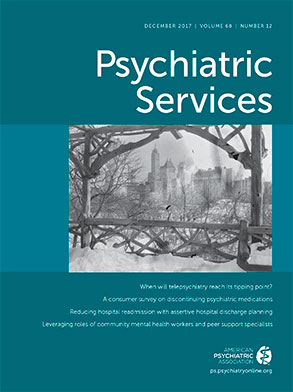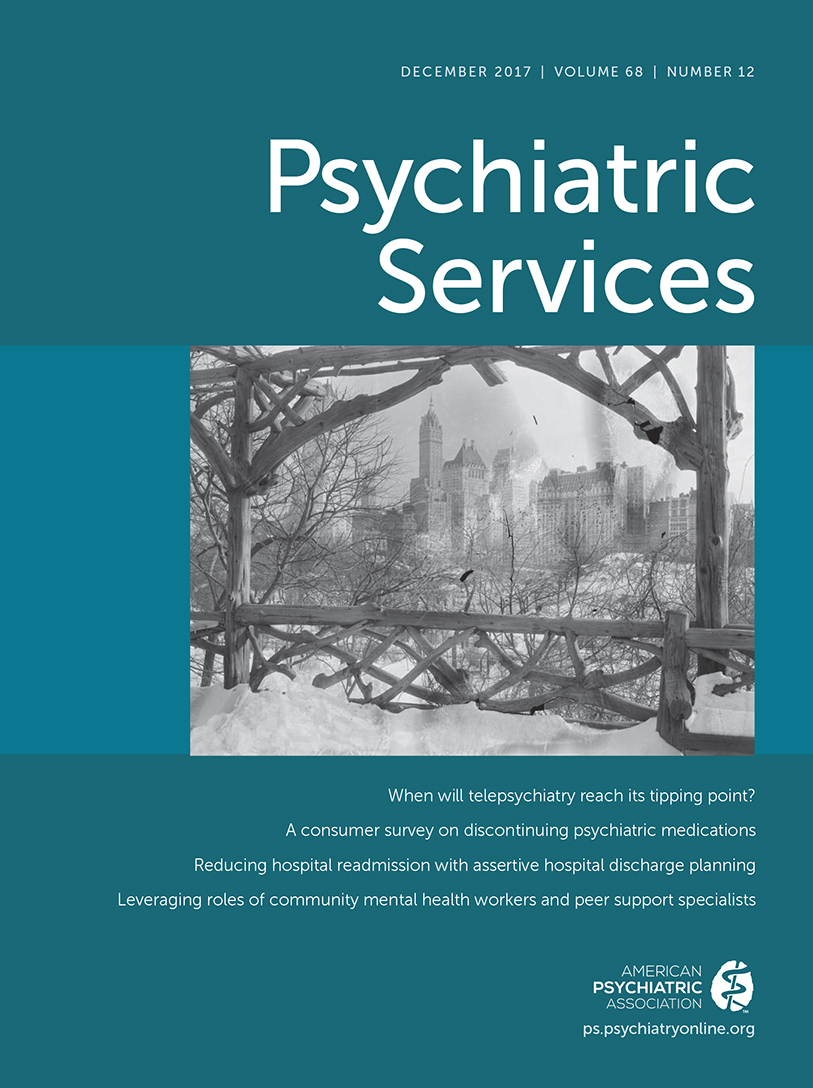Setting personally meaningful goals and acquiring the skills and support needed to progress toward their attainment is one of the basic foundations of psychiatric rehabilitation and recovery (
1,
2). Interestingly, research has revealed little concordance between psychiatric-service consumers and their providers in goal setting (
3,
4).
The importance of provider-consumer agreement on the goals of treatment and rehabilitation has long been recognized (
5). Without a joint process of goal setting, consumers feel less motivated and are less likely to attain their goals (
6). A recent meta-analysis (
3) indicated that psychotherapy outcomes are considerably enhanced when client and therapist are actively involved in a cooperative relationship based on goal consensus. Yet despite its importance, research on personal goal setting is scarce, mostly descriptive, and based on small samples and a limited number of domains (
2,
6). To fill these gaps, this study assessed concordance between consumers of psychiatric services and their providers for a broad range of personal domains and whether consumer-provider concordance was related to consumers’ self-reported goal attainment.
Methods
Data were collected as part of the Israeli Psychiatric Rehabilitation Patient Reported Outcome Measurement (PR-PROM) project (
7), in which consumer-reported outcomes for a range of rehabilitation realms, including goal-setting domains, are collected yearly. This information is linked at the service level and to demographic, clinical, and administrative data, with the overall aim of informing policy and practice at the local and national levels. The study was approved by the Ministry of Health’s Helsinki committee.
All users of psychiatric rehabilitation services in northern and central Israel were approached between April 2013 and April 2015 to partake in the PR-PROM. Of the total 13,264 psychiatric rehabilitation–service users, 7,292 (55%) signed informed consent and 4,584 (63%) completed the self-report questionnaires. Of the survey respondents, 3,236 (71%) had information that could be linked to the diagnoses data file. For 2,885 (89%) consumers, a service provider also completed a survey regarding their rehabilitation outcomes, and these consumers constituted the study sample. Consumers’ mean±SD age was 46.4±12.6 years. A total of 1,644 (57%) were men; 1,760 (61%) had 12 years of education or fewer; and 2,423 (84%) were diagnosed as having schizophrenia.
In comparison with participants who received psychiatric rehabilitation services but did not complete the assessment (N=3,281), the current study’s respondents were on average three years older (p<.05), were more likely to be men (p<.01), and had longer overall hospitalization stays (p<.05).
Consumers were asked to indicate up to two domains in which they had set a goal within the previous year from the following list: work, education, housing, social relations, leisure activities, mental health, physical health, financial situation, intimate relationship (partner), and family relationships. Providers were likewise asked to indicate up to two of the domains listed above in which they believed the consumer had set a goal. Because each consumer could have had more than one provider, we selected providers according to the person most knowledgeable about the consumer.
For each of the domains, consumers were asked to rate the degree to which their goal was achieved during the previous year (1=goal was not achieved at all, 2=goal was partly achieved, or 3=goal was achieved). We also created a dichotomous variable (0=goal was not achieved at all or 1=goal was at least partially achieved). We coded provider-consumer concordance in each domain as 1 if consumers and their providers indicated that the consumer had a goal and as 0 if consumers indicated having a goal but the provider did not. These measures were specific to each goal, such that for consumers who indicated having goals in two domains, concordance and goal attainment were examined for each goal separately.
A cross-sectional study design was used. We linked the consumer-reported data with the Ministry of Health’s data warehouse. All data were deidentified upon merging. We performed descriptive analysis to assess the percentage of goals identified by consumers and the providers by domain type. Chi-square analyses were performed to test the association between consumers' and providers' indication of goal setting in each domain. Chi-square analyses and logistic regression were used to test the association between concordance and consumer-reported goal attainment. We used SPSS, version 19, to manage and analyze the data.
Results
A total of 2,345 consumers (82%) reported setting a goal during the previous year. A higher number of providers reported goal setting by consumers (N=2,654, 92%). The most common domain in which a goal was set according to consumers’ and providers’ reports was work (N=1,182, 41%, and N=1,673, 58%, respectively). The least common domain that providers identified was family relationships (N=173, 6%) and that consumers identified was finances (N=115, 4%). In six of the 10 domains (work, family relationships, social ties, leisure, housing, and physical health), providers overestimated consumers’ having goals. In all other domains (intimate relationship, education, finances, and mental health), providers underestimated consumers’ having goals. Mental health was the domain most underestimated by providers (13% of providers vs. 20% of consumers).
Overall, provider-consumer concordance reached 54.4% (
Table 1). The domains with the highest concordance were employment (76%), housing (71%), and intimate relationship (partner) (52%); domains with the lowest concordance were family (23%) and finances (15%). Overall, for most domains (seven of 10), provider-consumer concordance was less than 50%.
On average, 75% (N=1,759) of consumers reported having achieved their goals, at least partly (ranging from 68% [N=1,595] who achieved financial goals to 85% [N=1,993] who achieved mental health goals). In all domains, consumers reported greater degrees of goal attainment than did their providers. For most domains (seven of 10), this difference achieved statistical significance (p=.045 to <.001). Examination of the percentage of self-reported goal attainment according to the summary measure of concordance on any of the goals showed that when providers acknowledge their consumers having goals (concordance), 80% of the goals are achieved, versus only 70% when there is no concordance (p<.001). The domains in which this gap was significant were housing, intimate relationship, education, physical health, leisure, and family (
Table 1). Additionally, the results of the logistic regression analysis showed that when concordance was reached in any of the domains, the odds of self-reported goal attainment were 1.70 (confidence interval=1.40–2.06).
Discussion
This study revealed large gaps between psychiatric service consumers and providers on the domains in which consumers report having personal goals. The importance of goal concordance was highlighted by the finding that consumer-provider concordance was associated with higher rates of goal attainment.
A major aspect of a good therapeutic alliance is agreement on goals and ways to achieve them (
5). Unfortunately, research has consistently shown that consumers and providers tend to disagree on a wide range of treatment issues, including goal setting (
7,
8). In the current study, for all domains, with the exception of work and housing, concordance reached 50% or less, indicating the more personal and potentially less self-evident nature of domains such as leisure, finances, and family.
Agreement on goals is fundamental (
9,
10) and should be systematically assessed and discussed rather than assumed. Such an effort is exemplified by the PR-PROM project (
7), in which participants are given feedback by using simple visual graphs reflecting their self-reported evaluation across a broad range of areas, including goal setting and attainment. The idea behind this feedback is that the consumer, if he or she desires, can initiate a discussion with the practitioner regarding the recovery process and thereby enrich the dialogue, which may improve consumer-provider communication (
11) and possibly agreement on goals.
Several limitations should be noted. First, the differences between our study population and other consumers of mental health services should be considered when extrapolating our results to the general population of consumers of mental health services. Also, because our measures were self-reported, future studies should examine the relationship between concordance and more objective outcomes. Finally, further studies should explore consumer and provider characteristics that may affect goal concordance and goal attainment, the degree to which consumers and providers actually discuss and agree on goals, and whether and how feedback tools, such as those developed as part of the PR-PROM project, are implemented.
Conclusions
Goal setting is at the heart of psychiatric rehabilitation and is a master signifier of the vision of recovery, because it translates into and motivates the process of creating a personally meaningful life. The current findings emphasize the importance of agreed-upon goals and call for the need to conceptualize goal setting as an interpersonal process in which building an alliance is key rather than a declarative goal-setting process that holds the danger of unnoticed disagreement followed by low goal attainment.
Acknowledgments
The authors thank the staff at the Department of Rehabilitation and the Department of Information and Evaluation at the Mental Health Services Division of the Ministry of Health as well as the entire team of the Psychiatric Rehabilitation Patient Reported Outcome Measurement project for their ongoing contributions.

